新版五年级英语下册各单元知识点
小学五年级英语下册各单元重点词语短语汇总
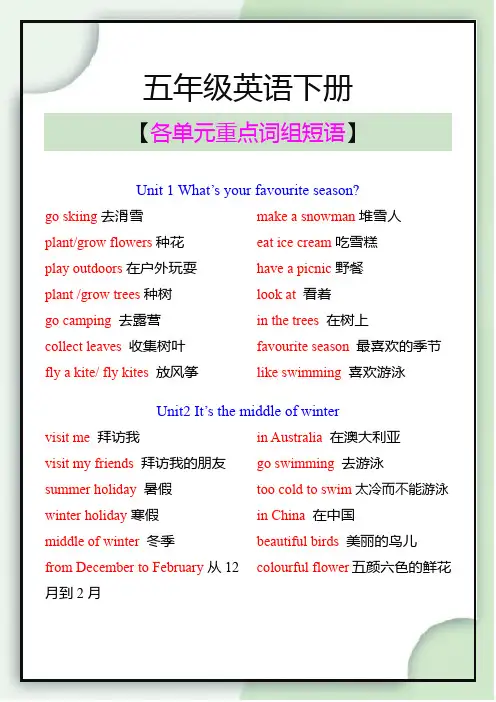
五年级英语下册【各单元重点词组短语】Unit 1 What’s your favourite season?go skiing去滑雪plant/grow flowers种花play outdoors在户外玩耍plant /grow trees种树go camping去露营collect leaves收集树叶fly a kite/ fly kites放风筝make a snowman堆雪人eat ice cream吃雪糕have a picnic野餐look at 看着in the trees 在树上favourite season最喜欢的季节like swimming 喜欢游泳Unit2 It’s the middle of wintervisit me 拜访我visit my friends 拜访我的朋友summer holiday 暑假winter holiday寒假middle of winter冬季from December to February从12月到2月in Australia 在澳大利亚go swimming去游泳too cold to swim太冷而不能游泳in China在中国beautiful birds美丽的鸟儿colourful flower五颜六色的鲜花Unit3 We are going to have an English testsee a film看电影have a party开一个聚会on June 11th在6月11日an English test一次英语考试tomorrow evening 明天晚上visit the museum参观博物馆anything else important其他重要的事情visit a farm参观农场have a sport meeting开校运会the school open day学校开放日New Year’s Day元旦Teachers’ Day 教师节Children’s Day 儿童节Women’s Day 妇女节May Day 劳动节Spring Festival 春节Christmas 圣诞节Mother’s Day 母亲节Tree Planting Day植树节Unit4 Have a good time in Hainanin Hainan在海南on Tuesday 在星期二for five days 持续五天的go for a picnic举行一次野餐all day 整天in the pool 在池里on the beach在海滩上under the stars 在星光下fly back home飞回家at noon在中午mountain climbing爬山have a good time过得愉快Unit 5 Would you like to go with us?plan to do计划去做go on a picnic去野餐at the school gate在学校门口see a film 看电影have a party举行一次聚会watch a football match 观看一场足球赛Unit 6 See you the partyinvite…to… 邀请…去做…call me on打我的电话at 2 p.m. 在下午两点钟at a surprise part在一个令人惊喜的聚会on this special day在这个特殊的日子里at the school meeting room在学校会议室Unit 7 We will go by trainon foot 步行the Great Wall 长城the Summer Palace颐和园take a walk 散步plan for the holiday假期计划go traveling去旅行go by train 乘火车去on October 2nd在10月2日come back home 回家ride a bike 骑自行车go boating 去划船see the picture show 看画展have fun娱乐visit Window of the World 参观世界之窗Unit8 Ben’s first trip to Beijingby plane乘飞机trip to Beijing去北京旅行fly back home 搭乘飞机回家by underground 乘地铁on Friday morning在星期五早上an exciting trip一次激动的旅行drive to the Great Wal l开车去长城in Wangfujing Street在王府井大街take a walk around the lake环湖散步Unit9 Be careful!come on来吧;快点;赶快watch out 注意fall down 跌倒in trouble 遇到麻烦the hot water 热水get sick 生病be careful 小心cut yourself 割伤你自己climb a tree 爬树eat a bad apple吃一个坏苹果touch a fan 摸风扇feed the animals喂动物get hurt 受伤help each other 互相帮助Unit 10 How to stay safecross the street过马路climb tall trees爬很高的树in the street在大街上during school hours在学校期间at the traffic lights在交通灯区on the stairs在楼梯上from strangers从陌生人那里safety crossing安全的路口take money拿钱safety first安全第一Stay safe保持安全Unit 11Can you tell me the wayover there 在那边the way to 去…的路turn right向右转turn left向左转at the second crossing在第二个十字路口on the left在左边on the right在右边next to the school 在学校的隔壁Excuse me. 劳驾;请原谅post office邮局You’re welcome.不客气We’re lost. 我们迷路go straight ahead直走train station 火车站police station警察局Unit 12 I know a shirt cutshort cut 捷径on time 及时;按时in front of 在…前面in ten minutes在十分钟内get there到达那里get to the cinema到达电影院out of their house从他们的房子走出来take the first right在第一个路口右转start to walk quickly开始赶快a different way一条不同的路the main street 大街主干walk through the park走路穿过公园。
五年级下册英语六个单元的,知识
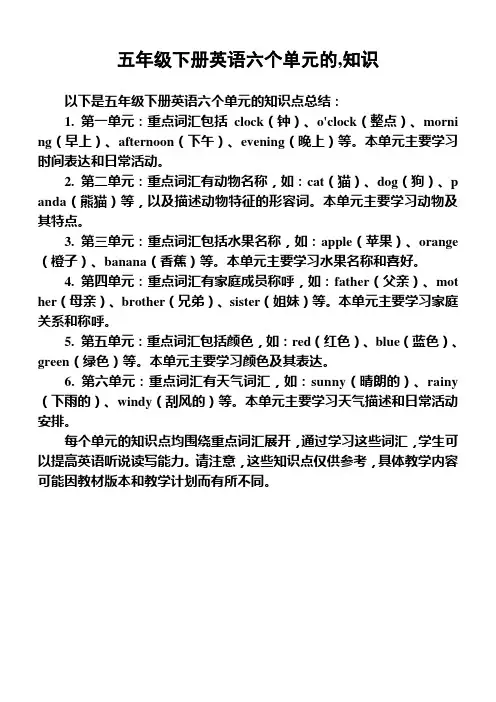
五年级下册英语六个单元的,知识
以下是五年级下册英语六个单元的知识点总结:
1. 第一单元:重点词汇包括clock(钟)、o'clock(整点)、morni ng(早上)、afternoon(下午)、evening(晚上)等。
本单元主要学习时间表达和日常活动。
2. 第二单元:重点词汇有动物名称,如:cat(猫)、dog(狗)、p anda(熊猫)等,以及描述动物特征的形容词。
本单元主要学习动物及其特点。
3. 第三单元:重点词汇包括水果名称,如:apple(苹果)、orange (橙子)、banana(香蕉)等。
本单元主要学习水果名称和喜好。
4. 第四单元:重点词汇有家庭成员称呼,如:father(父亲)、mot her(母亲)、brother(兄弟)、sister(姐妹)等。
本单元主要学习家庭关系和称呼。
5. 第五单元:重点词汇包括颜色,如:red(红色)、blue(蓝色)、green(绿色)等。
本单元主要学习颜色及其表达。
6. 第六单元:重点词汇有天气词汇,如:sunny(晴朗的)、rainy (下雨的)、windy(刮风的)等。
本单元主要学习天气描述和日常活动安排。
每个单元的知识点均围绕重点词汇展开,通过学习这些词汇,学生可以提高英语听说读写能力。
请注意,这些知识点仅供参考,具体教学内容可能因教材版本和教学计划而有所不同。
人教版小学英语五年级下册各单元知识点
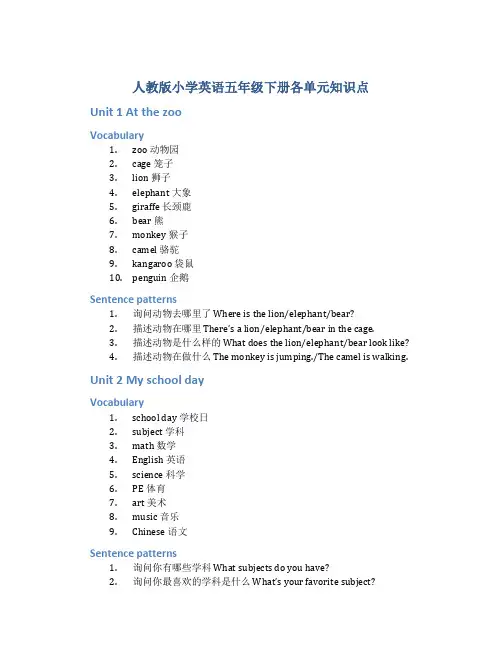
人教版小学英语五年级下册各单元知识点Unit 1 At the zooVocabulary1.zoo 动物园2.cage 笼子3.lion 狮子4.elephant 大象5.giraffe 长颈鹿6.bear 熊7.monkey 猴子8.camel 骆驼9.kangaroo 袋鼠10.penguin 企鹅Sentence patterns1.询问动物去哪里了 Where is the lion/elephant/bear?2.描述动物在哪里There’s a lion/elephant/bear in the cage.3.描述动物是什么样的 What does the lion/elephant/bear look like?4.描述动物在做什么 The monkey is jumping./The camel is walking. Unit 2 My school dayVocabulary1.school day 学校日2.subject 学科3.math 数学4.English 英语5.science 科学6.PE 体育7.art 美术8.music 音乐9.Chinese 语文Sentence patterns1.询问你有哪些学科 What subjects do you have?2.询问你最喜欢的学科是什么What’s your favorite subject?3.描述你正在上什么学科I’m having math/English/science class now.4.询问你在哪个班级 What class are you in?Unit 3 At a partyVocabulary1.party 派对2.balloon 气球3.present 礼物4.birthday 生日5.cake 蛋糕6.candle 蜡烛7.card 卡片Sentence patterns1.询问你们在庆祝什么 What are you celebrating?2.询问你送了什么礼物 What present did you bring?3.描述蛋糕上有多少个蜡烛 There are four candles on the cake.4.描述你在派对上吃了什么 I ate cake and drank soda.Unit 4 My clothesVocabulary1.clothes 衣服2.jacket 夹克衫3.shirt 衬衫4.dress 连衣裙5.skirt 短裙6.pants 裤子7.socks 袜子8.shoes 鞋子Sentence patterns1.询问你喜欢穿什么样的衣服 What clothes do you like to wear?2.询问今天你穿了什么衣服 What clothes are you wearing today?3.描述你的外套是什么样的 My jacket is blue.4.描述你的鞋子是什么颜色的 My shoes are red.Unit 5 My familyVocabulary1.family 家庭2.mother 母亲3.father 父亲4.sister 姐妹5.brother 兄弟6.grandmother 奶奶7.grandfather 爷爷8.aunt 阿姨9.uncle 叔叔Sentence patterns1.询问你有几口人家庭 How many people are there in your family?2.询问你和家人一起住吗 Do you live with your family?3.描述你的妈妈是什么样的 My mother is kind.4.描述你和兄弟姐妹的关系很好 My sister and I get along well.。
英语五年级下册笔记
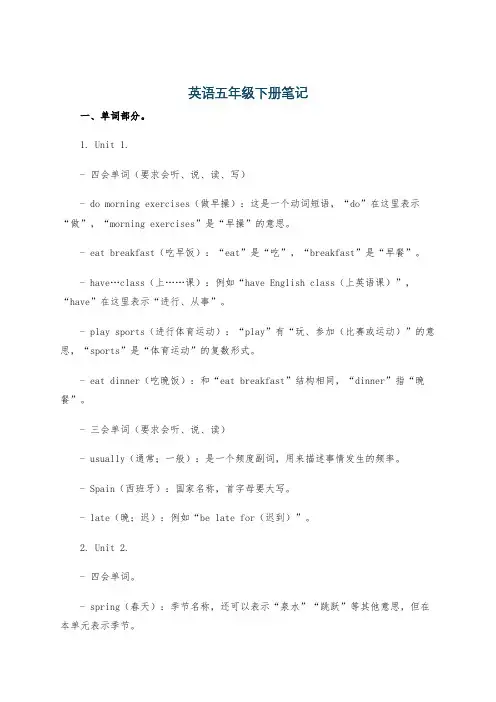
英语五年级下册笔记一、单词部分。
1. Unit 1.- 四会单词(要求会听、说、读、写)- do morning exercises(做早操):这是一个动词短语,“do”在这里表示“做”,“morning exercises”是“早操”的意思。
- eat breakfast(吃早饭):“eat”是“吃”,“breakfast”是“早餐”。
- have…class(上……课):例如“have English class(上英语课)”,“have”在这里表示“进行、从事”。
- play sports(进行体育运动):“play”有“玩、参加(比赛或运动)”的意思,“sports”是“体育运动”的复数形式。
- eat dinner(吃晚饭):和“eat breakfast”结构相同,“dinner”指“晚餐”。
- 三会单词(要求会听、说、读)- usually(通常;一般):是一个频度副词,用来描述事情发生的频率。
- Spain(西班牙):国家名称,首字母要大写。
- late(晚;迟):例如“be late for(迟到)”。
2. Unit 2.- 四会单词。
- spring(春天):季节名称,还可以表示“泉水”“跳跃”等其他意思,但在本单元表示季节。
- summer(夏天):注意其发音,字母“u”发/ʌ/音。
- autumn(秋天):也可以说“fall”,尤其在美国英语中。
- winter(冬天):这四个季节单词是描述天气和季节相关话题的基础词汇。
- season(季节):是一个可数名词,复数形式是“seasons”。
- 三会单词。
- picnic(野餐):常和“have a picnic(去野餐)”搭配使用。
- go on a picnic(去野餐):这是一个常用短语。
- pick(摘;采集):例如“pick apples(摘苹果)”。
- pick up(捡起;拾起):有不同的含义,在这里是“捡起”的意思。
新精通版五年级下册小学英语全册单元知识点小结

Unit Welcome to our school!一、核心词汇1.名词music音乐way路;道路library图书馆2.代词we我们our我们的3.动词meet相遇;开会welcome欢迎have有like喜欢4.其他all所有;全部many许多also也;同样very much非常please请二、拓展词汇1.动词borrow(向某人、从某人)借2.短语science lesson科学课English lesson英语课meeting room会议室science lab科学实验室language lab语言实验室art club美术(艺术)俱乐部music club音乐俱乐部borrow books借书have a meeting开会paint a picture(用颜料)绘画play the piano弹钢琴三、核心句型1. Welcome to our school! 欢迎来到我们学校!解读:这是一个迎接宾客的礼貌用语,是一个祈使句,其后跟地点名词。
举一反三: Welcome to our city! 欢迎来到我们城市!Welcome to China! 欢迎来到中国!2. We often borrow books from the library. 我们经常从图书馆里借书。
解读:这是一个描述某人经常做某事的句型。
举一反三: They often borrow some English books from Beijing Library. 他们经常从北京图书馆里借一些英语书。
3. —How many English lessons do you have in a week? 你们一周有多少节英语课?—We have three. 我们有三节。
解读:这是用来询问对方有多少节课的句型。
举一反三: —How many PE lessons do you have in a week? 你们一周有多少节体育课?—We have five. 我们有五节。
新人教版PEP 【小学五年级英语下册】 单元知识点 归纳总结
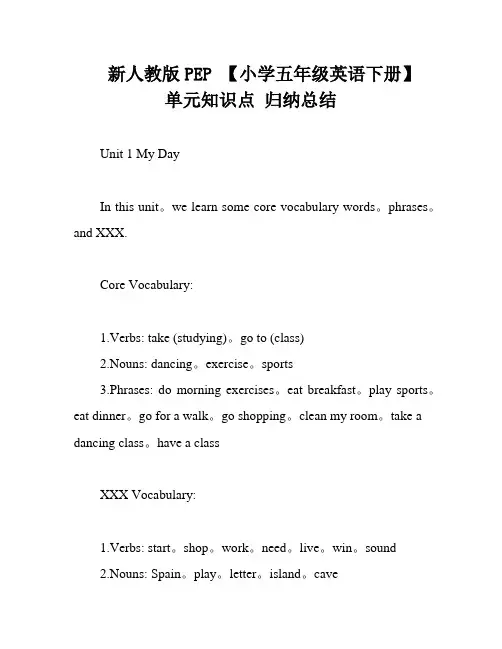
新人教版PEP 【小学五年级英语下册】单元知识点归纳总结Unit 1 My DayIn this unit。
we learn some core vocabulary words。
phrases。
and XXX.Core Vocabulary:1.Verbs: take (studying)。
go to (class)2.Nouns: dancing。
exercise。
sports3.Phrases: do morning exercises。
eat breakfast。
play sports。
eat dinner。
go for a walk。
go shopping。
clean my room。
take a dancing class。
have a classXXX Vocabulary:1.Verbs: start。
shop。
work。
need。
live。
win。
sound2.Nouns: Spain。
play。
letter。
island。
cave3.ns: after4.XXX: when。
XXX。
a.m。
p.m。
why。
last。
also。
busy5.nal Vocabulary: frequency adverbs (always。
usually。
sometimes)Phrases:watch TV。
eat lunch。
go to bed。
go swimming。
go home。
go to schoolCore Sentence Structure:When do you do morning exercises?" "At 7 o'clock."XXX phrase is "good job" to praise XXX.Which season do you like best。
I like winter best。
This sentence means "which one do you like the most" and "like。
新版PEP五年级英语下册各单元的知识点
新版PEP五年级英语下册各单元知识点一. 重点词汇。
1. 四会:eat breakfast吃早饭 have···class 上······课 play sports 进行体育运动exercise 活动;运动 do morning exercises做早操 eat dinner吃晚饭clean my room 打扫我的房间 go for a walk 散步 go shopping 去买东西;购物take学习;上(课) dancing 跳舞;舞蹈 take a dancing class 上舞蹈课2. 三会:when什么时候 after在(时间)后 start开始 usually通常地;惯常地 Spain西班牙late晚;迟 a.m.午前;上午 p.m.午后;下午 shop去买东西;购物 why为什么work工作 sound听起来好像 also还;也 last上一个的;刚过去的 busy忙的need需要 play戏剧;剧本 letter信 live居住 island 岛win获胜 always总是;一直 cave山洞;洞穴 go swimming去游泳二. 其他日常活动。
get up起床 eat lunch吃午饭 go to bed 上床睡觉wash my face洗脸 wash my clothes 洗我的衣服 watch TV看电视play ping-pong打乒乓球 play the pipa弹琵琶 go swimming 去游泳go running去跑步 do homework 做作业 do kung fu练武术play football踢足球 play basketball打篮球三. 频度副词。
always总是,一直(100%)usually通常(80%) often 经常(60%)sometimes有时(30%)四. 重点句型。
五年级英语下册1-4单元知识点汇总
五年级英语下册1-4单元知识点汇总**Unit 1: Our School****Vocabulary:*** classroom: 教室 * library: 图书馆 * playground: 操场* canteen: 食堂 * office: 办公室 * teacher's desk: 讲台 * computer room: 电脑室 * art room: 美术室 * music room: 音乐室**Sentences:*** This is our school. 这是我们的学校。
* Our school has a big playground. 我们的学校有一个大操场。
* We have many books in our library. 我们的图书馆里有很多书。
* The teachers work in the office. 老师们在办公室工作。
**Grammar:*** Use "has" or "have" to describe possession. 使用“has”或“have”来描述所属关系。
* Use "our" to refer to possession of the group. 使用“our”来指代群体的所属。
**Unit 2: My Family****Vocabulary:*** family: 家庭 * father: 父亲 * mother: 母亲 * brother: 兄弟 * sister: 姐妹 * grandparent: 祖父母 * uncle: 叔叔 * aunt: 阿姨**Sentences:*** This is my family. 这是我的家庭。
* I have a happy family. 我有一个幸福的家庭。
* My father is a doctor. 我的父亲是一名医生。
人教版新起点英语五年级下册全册单元知识点
Unit 1 Keep Healthy(保持健康)一、单元词汇too much 太多candy 糖果go to bed 去睡;就寝early 早exercise 锻炼tired 困倦的;疲倦的drink 喝;饮before 在......之前dirty 肮脏的always 总是stomachache 胃疼headache 头疼toothache 牙痛a lot of 大量;许多sleepy 困的;欲睡的subject 学科mark 分数advice 建议more 更多的二、单元句型1. A: What s wrong? 怎么了?B: I ve got a stomachache. 我肚子疼。
2. A: I often have stomachaches. What should I do?我经常肚子疼。
我应该怎么办?B: You should drink some water. 你应该喝些水。
3. Here you are. 给你。
4. A: Do you eat a lot of candy? 你吃了很多糖吗?B: Yes, I eat some after every class. 是的,我每节课后都吃很多。
5. You shouldn t eat too much candy. 你不该吃太多糖。
6. A: Do you wash your hands before eating? 你饭前洗手了吗?B: Not always. 不总洗。
7. You shouldn t eat with dirty hands. 你不该用脏手吃饭。
8. You should always wash your hands before eating.你应该坚持饭前洗手。
9. I always feel tired and sleepy. 我总觉得很累很困。
10. I have some advice for you. 我给你一些建议。
五下1234单元英语总结
五下1234单元英语总结一、单元概述五下1234单元是小学英语教材中的重要部分,内容涵盖了语言基础知识、听说读写等方面。
通过学习这些单元,学生们可以扩大词汇量,提高朗读和听力技能,培养对英语的兴趣和自信心。
本篇文档将对五下1234单元的内容进行总结,帮助学生们更好地了解和掌握这些知识点。
二、具体内容1. 第一单元第一单元主要学习了关于问候和介绍的知识。
学生们通过这个单元,学会了用英语与人打招呼和自我介绍。
同时,还学习了一些关于国家和语言的表达方式。
2. 第二单元第二单元着重学习了一些关于家庭的词汇和表达方式。
学生们可以描述家庭成员的姓名和职业,并能够用简单的句子表达家庭成员之间的关系。
3. 第三单元第三单元以“学校生活”为主题,学生们学习了一些关于学校和课堂的词汇,还学会了问答有关上学日常活动的问题。
4. 第四单元第四单元主要学习了一些与食物和饮料相关的词汇。
学生们能够用简单的句子表达喜欢和不喜欢的食物,并学会了与他人一起点餐的基本表达方式。
三、学习方法学习英语需要良好的学习方法和习惯。
下面给出几点建议,帮助同学们有效地学习五下1234单元的内容:1.多与他人练习对话:与他人练习对话是提高口语表达能力的有效方法。
可以与同学们一起组队练习对话,并互相纠正发音和语法错误。
2.多做课后习题:课后习题是巩固所学知识的好方法。
可以找同学之间相互出题答题,也可以向老师请教不懂的地方。
3.利用多媒体资源:在学习英语的过程中,可以借助多媒体资源,如英语学习软件、英语歌曲和视频等。
这些资源可以帮助同学们扩展词汇量,提高听力和阅读能力。
4.保持良好的学习习惯:学习英语需要持之以恒的努力,要保持每天都抽出一定时间进行学习,并养成复习和总结的习惯。
四、小结通过五下1234单元的学习,同学们不仅掌握了基础的英语词汇和表达方式,还培养了一定的听说读写技能。
希望同学们能够在今后的学习中继续努力,不断提高自己的英语水平。
以上是五下1234单元英语的总结,希望对同学们的学习有所帮助。
- 1、下载文档前请自行甄别文档内容的完整性,平台不提供额外的编辑、内容补充、找答案等附加服务。
- 2、"仅部分预览"的文档,不可在线预览部分如存在完整性等问题,可反馈申请退款(可完整预览的文档不适用该条件!)。
- 3、如文档侵犯您的权益,请联系客服反馈,我们会尽快为您处理(人工客服工作时间:9:00-18:30)。
PEP五年级英语下册各单元知识点Unit 1 My day一. 频度副词。
always总是,一直(100%)usually通常(80%)often 经常(60%)sometimes有时(30%)二. 重点句型。
1. 询问别人什么时候做某事的句型及回答。
句型结构:问:When do you+动词短语原形+其他(你/你们什么时候做某事)答:I/We(+频度副词)+动词短语原形+at+具体时间(我/我们通常在几点做某事。
)例:问:When do you go to bed(你什么时候上床睡觉)答:I go to bed at 9:(我晚上9点上床睡觉。
)注意:当主语是第三人称单数(he,she,it,单个人名或单数名词)时,助动词do要变成does,句型结构是:When does+主语(第三人称单数)+动词短语原形+其他2. 询问别人周末做什么的句型及回答。
句型结构:问:What do you do on the weekend(你周末做什么)答:I(+频度副词)+动词(短语)+其他。
例:问:What do you do on the weekend(你周末做什么)答:I usually read books. (我通常看书。
)注意:当主语是第三人称单数(he,she,it,单个人名或单数名词)时,助动词do要变成does, 句型结构是:What does+主语(第三人称单数)+do+on the weekend三.句型转换:1.肯定句?一般疑问句:I usually get up at 6:00. ? Do you usually get up at 6:00 肯定回答:Yes, I do. 否定回答:No, I don't. (第三人称时) He eats dinner at 6:. ? Does he eat dinner at 6:.2.肯定句?否定句:I like playing the piano. ? I don't like playing the piano.I can play the piano. ? I can't play the piano. 3.划线提问:⑴I often go shopping on the weekend. →When do you go shopping⑵I often go shopping on the weekend. →What do you do on the weekend ⑶I go to school at 7:00. →When do you go to school四. 四会句子:When do you finish class in the morning 你们上午的课到几点结束We finish class at 1 o'clock . 我们一点钟结束上午的课。
What do you do on the weekend 你周末做什么I often watch TV and play ping-pong with my father .我经常看电视,也常和我爸一起打乒乓球。
五. 语音:cl /kl/ clean clock class clever pl /pl / plate eggplant please playUnit 2 My favourite season一. 重点句型1. 询问别人天气怎么样的句型及回答。
句型结构:问:What's the weather like+时间+地点(······天气怎么样)答:It's+表示天气的形容词例:问:What's the weather like in winter in Beijing(北京冬天的天气怎么样)答:It's cold and windy.(有风而且寒冷。
)2. 询问别人最喜欢的季节句型及回答。
句型结构:问:Which season do you like best (你最喜欢的季节是哪一个)答:I like+季节+best或直接说季节名称。
同义句还有:What's your favourite season 3. 询问别人喜欢某个季节的原因的句型及回答。
句型结构:问:Why do you like+季节名称或直接用“Why”来提问。
答:一般要用“because”引导的句子来说明理由,可以从天气相关的活动等方面来说。
例:问:Why do you like spring(你为什么喜欢春天)答:Because I can fly kites.(因为我能放风筝。
)问:Why do you like summer(你为什么喜欢夏天)答:Because I can go swimming everyday.(因为我每天都能去游泳。
)问:Why do you like autumn(你为什么喜欢秋天)答:Because the weather is cool.(因为天气凉爽。
)问:Why do you like winter(你为什么喜欢冬天)答:Because I can make a snowman.(因为我能堆雪人。
)二. 四会句子:Which season do you like best , Mike 迈克,你最喜欢哪个季节Winter . 冬天。
Why 为什么Because I like summer vacation ! 因为我喜欢暑假!三. 句型转换:1. 肯定句?一般疑问句:⑴I like summer. ? Do you like summer肯定回答:Yes, I do. 否定回答:No, I don't.⑵It is sunny and hot. ? Is it sunny and hot肯定回答:Yes, it is. 否定回答:No, it isn't. ⑶The sky is very blue. ? Is the sky very blueThe leaves are colourful. →Are theleaves colourful 2. 划线提问:⑴I like summer best. →Which season do you like best⑵My favourite season is winter. →What is your favourite season⑶It is sunny in May in Beijing. →What is the weather like in May in Beijing ⑷I'd like to swim. →What would you like to do四.语音:br /br/ brown library brother umbrella gr /gr/ green grapes grandpa growUnit 3 My school calendar一、注意:1. 月份的首字母一定要大写。
2. May,June, July没有缩写形式,September的缩写形式是“Sept.”,其他月份单词的缩写形式都是有单词的前三个字母加“·”构成。
3. 月份的缩写形式不用在句子中,只能单独使用。
4. 表示“在几月”时,要在月份单词前面加介词in, 但在几月几日用on。
二. 活动名称sports meet 运动会Easter party 复活节聚会school trip 学校旅行Chinese test 语文测试singing contest歌咏比赛birthday party生日聚会三. 介词in . on. at的用法。
1. in后面+上午/下午/晚上/月份/季节/年份。
如:in the morning, in April, in winter, in 2015. 2. on的后面+具体的某一天。
如:on Monday, on April 3rd, on Friday morning. 3. at后面+具体的时间点或与其他词构成固定搭配。
如:at six o'clock, at 12:30 at noon.四. 重点句型。
1. 问答某个活动或节日在几月份的句型及回答。
句型结构:问:When is+活动或节日名称答:It's in+月份。
例:问:When is Christmas(圣诞节在什么时候)答:It's in December.(在十二月。
)2. 询问别人将要做什么的句型及回答。
句型结构:问:What will you do+其他答:I will····=I'll···例:问:What will you do for your mum on Mother's Day(母亲节你将为你妈妈做什么)答:I'll give her some flowers.(我将送给她一些花。
)3. 表达“我们将要···”的句型。
We'll···=We will 后面+动词原形,这是一个一般将来时的句子,表示将来某个时间要发生的动作或事情。
例:We'll have a school trip.(我们将有一次学校旅行。
)We'll have a singing contest.(我们将有一次歌咏比赛。
)We'll take a dancing class.(我们将要上一节舞蹈课。
)五. 句型转换:⒈肯定句→一般疑问句:①把be动词(am/is/are)调到句首:第一、二人称:My birthday is in June. ? Is your birthday in June 第三人称:John's birthday is May 1st. ? Is John's birthday May 1st(这里主要讲的是生日,因此回答一律用it 来回答:Yes, it is. / No, it isn't. )⒉肯定句?否定句:在be动词(am/is/are)后+ not:His birthday is in January ? His birthday isn't in January ( is not = isn't )⒊划线提问:My birthday is in February. →When is your birthdayAmy's birthday is Apr. 9th. →Whose birthday is Apr. 9thThe Children's Day is June 1st . →When is the Children's Day六.四会句子:When is the party 聚会什么时候举行It's in April . 在4月。
